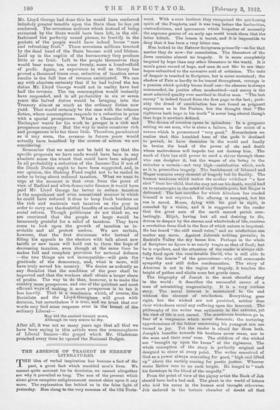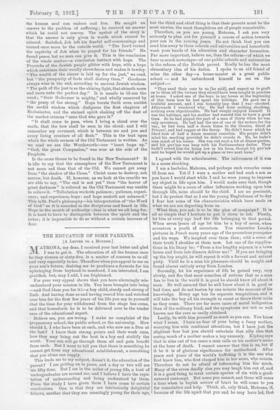THE ABSENCE OF TRAGEDY IN HEBREW LITERATURES. T HE idea of
verbal inspiration has become a fact of the past, a great fact which moulded men's lives. We cannot quite account for its dominion, we cannot altogether see why it prevailed so long. The sun of the present which alone gives complete enlightenment cannot shine upon it any more, The explanation lies behind us in the false light of yesterday. Men clung to the very commas of the Old Testa-
ment. With a sure instinct they recognized the quickening spirit of the Prophets, and it was long before the barbarities, contradictions, and ignorances which bespatter of necessity the supreme genius of an early age could teach them that the letter killeth. The lesson is learnt, and it is impossible. to deny that it has been a very bitter one.
Men looked to the Hebrew Scriptures primarily—as for that matter they do now—for consolation. The literature of the Jews contains almost no tragedy. It is more completely inspired by hope than any other literature in the world. It is man's great record of hope, and men do not like to see their hopes submitted to the corrosive acid of criticism. The note of despair is touched in Scripture, but is never sustained; the shadow of Fate is hardly to be traced throughout, revenge is a passion which quickly burns itself out—its absence is always commended, its justice often miedoubted—and mercy is the most admired quality ever ascribed to God or man. " The last enemy " is indeed feared from the first page to the last; prob- ably the dread of annihilation has not found as poignant expression as in the Psalms, but the thought that " The righteous bath hope in his death" is never long absent though
that hope is nowhere defined. •
The drama of creation opens in splendour. In a gorgeous setting we see man, who is alone a failure, in the midst of a nature which is pronounced "very good." Nevertheless we realize that this humbled hero of the gods is destined to prevail, to have dominion in the world and finally to bruise the head of the power of sin and death whose malevolence will impede but not destroy him. The mark of Cain has still power to send a shiver through those who can decipher it, but the wages of sin bring to the onlooker a certain—not very high—satisfaction which, such as it is, proscribes tragedy. The banishment of Ishmael and Hagar contains every element of tragedy but its finality. The human weakness which makes the mother withdraw "a bow shot " from her child, that she may not see his death, would lead on to catastrophe in the mind of any Gentile poet; but Hagar is delivered. The last sacrifice for which Abraham has steeled himself is not required. His offering is accepted, but his son is saved. Moses, dying with his goal in sight, is consoled by a vision, and it is suggested to the reader that the great men of the earth cannot perish ever- lastingly. Elijah, having lost all and desiring to die, driven to despair by the storms and whirlwinds of life, receives a revelation from God in the face of which nature is impotent. He has heard "the still small voice," and no misfortune can matter any more. Against Jehovah nothing prevails; in Ezekiel's Valley the dry bones live. Perhaps in the whole of Scripture no figure is so nearly tragic as that of Saul; but he is repellent, and the attention of the reader is always skil- fully fixed upon the ever-lovable David, who is still able to "bow the hearts" of the generations—who still commands sympathy and still defies condemnation. The story of Absalom is not in the region of tragedy, it touches the height of pathos and elicits none but gentle tears.
The biography of Joseph is the most cheerful story in the world : it describes the successful career of a man of astonishing magnanimity. It is a very curious story. The moral interest is maintained to the end without the element of retribution. Everything goes right, but the wicked are not punished, neither does their wickedness entail any suffering upon the innocent. The philosophy of the writer was optimistic in the extreme, yet his view of life is not unreal. The murderous brethren go in fear of a vengeance which never descends; the torturing apprehensions of the father concerning his youngest son are turned to joy. Yet the reader is afraid for them both. Joseph's benefits towards his brothers never cease, nor to the eons and their sons' sons. The children of the wicked are " brought up upon the knees" of the righteous. The whole conception of the story is perfectly original and designed to cheer at every point. The writer conceived of God as a power always overruling for good," high and lifted up" above the earthly craving for poetic justice. Whoever wrote Esther rose to no such height. He longed to " wash his footsteps in the blood of the ungodly."
From the point of view of the pigmy artist the Book of Job should have had a bad end. The giant in the world of letters who laid his scene in the human soul thought otherwise. Job endured in the torture chamber of doubt all that the human soul can endure and live. He sought an ~newer to the problem of suffering ; he received an answer which he could not convey. The upshot of the story is that the answer is only given in words which cannot be uttered. Satisfied, Job left his fearful self-communings and turned once more to the outside world. " The Lord turned the captivity of Job when he prayed for his friends." He found peace, but no man oan give it. This is the conclusion of the whole matter—a conclusion instinct with hope. The Proverbs of the Jewish people glitter with hope, with a hope which outshines their wordly shrewdness and makes it tawdry.
" The wealth of the sinner is laid up for the just," we read, but " the prosperity of fools shall destroy them." Goodness always wins in the end, according to ancient Jewish wisdom.
" The path of the just is as the shining light, that shineth more and more unto the perfect day." It is unsafe to ill-use the weak; "their Redeemer is mighty," and wholly unmoved by " the pomp of the strong." Hope bursts forth even amidst the sordid wisdom which disfigures the first chapters of Ecclesiastes, and the stained spirit shaking off the dust of the market returns " unto God who gave it."
"It shall come to pass, when I bring a cloud over the earth, that the bow shall be seen in the cloud: and I will remember my covenant, which is between me and you and every living creature of all flesh." This is the text upon which the whole sermon of the Old Testament is written. As we read we are like Wordsworth—our "heart leaps up." " God, the great Companion," was ever at the side of the Prophets.
Is the same theme to be found in the New Testament ? It is idle to say that the atmosphere of the New Testament is not more sad than that of the Old. We cannot get away from " the shadow of the Cross." Christ came to destroy, not sorrow, but death. If, however, as we look at the crucifix we are able to say, " The end is not yet " then " the horror of great darkness " is relieved as the Old Testament was unable to relieve it. "Tribulation workoth patience ; patience, experi- ence ; and experience, hope : and hope maketh not ashamed." This is St. Paul's philosophy—his interpretation of "the Word of God" as it is recorded in the Scriptures and heard in life. Hope in the mouth of authority—that is what we all long for. It is hard to have to distinguish between the spirit and the letter; it is impossible to do so without a certain increase of fear.











































 Previous page
Previous page